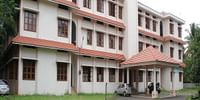Ph.D. (Statistics)- Full Time
Doctor of Philosophy in Statistics Top Colleges, Syllabus, Scope and Salary
Ph.D. in Statistics is a 2-year postgraduate course in Statistics, which is a branch of mathematics that deals with the collection, analysis, interpretation, and presentation of numerical data. It is a tool for data-based prediction and forecast. It is applicable to a wide variety of academic disciplines, from the natural and social sciences to the humanities, government, and business.
Statistics is a key tool in business and manufacturing as well. It is utilized to comprehend measurement systems’ variability, control processes for abridging data, and for making data-driven choices. A Statistician gathers, verifies, and translates information and utilizes the same to tackle issues in a wide assortment of fields.
| Doctor of Philosophy in Gujarat | Doctor of Philosophy in Tamil Nadu | Doctor of Philosophy in Rajasthan | Doctor of Philosophy in Karnataka |
For pursuing Ph.D. in Statistics, aspiring candidates need to have completed M.Stat./ M.A./ M.Sc., or equivalent qualification in any of Mathematics, Statistics, and Science.
Selection to the course is based on the candidate’s obtained merit at the level of graduation, or performance in a relevant entrance test, and performance in the subsequent round of interview.
Such postgraduates are hired in capacities such as Data Analyst, Research Analyst, Assistant Professor, Biostatistician, Data Interpreter, Econometrician, Enumerator, Lecturer, Research Scholar, Statistician, Test Content Developer – Humanities, Content Developer – Sociology, Labour Counsellor, Article Writer, Curriculum Trainer – Sociology, Trainee Associate, Sociologist, Trainee - Teaching Associates, Asst. Professor & Lecturer, etc.
The average tuition fee charged for the course in India ranges between INR 2,000 and 5 Lacs for a span of 2 years. In India, the average annual salary of a Statistician can be expected to lie between INR 2.5 and 3.5 lacs.
Ph.D. in Statistics: Course Highlights
Listed below are some of the major highlights of the course.
| Course Level | Doctorate |
| Duration | 2 years |
| Examination Type | Semester System |
| Eligibility | Post-graduation (M.Stat./ M.A./ M.Sc.) |
| Admission Process | Based on obtained merit/ Direct interview of the short-listed candidates. |
| Course Fee | INR 2,000 to 5 Lacs |
| Average Starting Salary | INR 4 to 10 lacs per annum |
| Top Recruiting Companies | Deloitte Consulting, TCS Innovations Labs, Blue Ocean Marketing, BNP Paribas India, Neilson Company, Accenture, HP, GE Capital, HDFC, Cognizant, American Express, RBI, HSBC, Indian Market Research Bureau, Genpact, etc. |
| Top Recruiting Area | Census, Ecological, Medical, Election, Crime, Education, Film, Cricket, Tourism, Govt. Jobs, Indian Economic Services, Businesses, Commerce, Indian Statistical Services, Social Research, Consulting Firms, Data Survey Agencies, Insurance, Statistical Research, Economics, Finance, Public-Sector Undertakings (PSUs), Statistical and Economic Bureaus, Banks, etc. |
| Job Positions | Data Analyst, Research Analyst, Assistant Professor, Biostatistician, Data Interpreter, Econometrician, Enumerator, Lecturer, Research Scholar, Statistician, Test Content Developer – Humanities, Content Developer – Sociology, Labor Counsellor, Article Writer, Curriculum Trainer – Sociology, Trainee Associate, Sociologist, Trainee - Teaching Associates, Asst. Professor & Lecturer, etc. |
Ph.D. in Statistics: What is it About?
The program offers to eligible candidates a wide base of advanced learning in Theoretical Statistics, Applied Statistics, Probability, and such areas of study.
Ph.D. is a research-based program in Statistics. The course consists of four areas of specialization, viz. Biostatistics, Mathematical/Probability Statistics, Statistical Modeling, and Actuarial Science/Financial Mathematics. A compulsory thesis needs to be submitted by students of the course upon completion of 24 months of study of the subject.
Ph.D. in Statistics: Course Objectives
As a mathematical science, Statistics is concerned with the presentation, interpretation, collection, analysis, and explanation of data. It aims to impart to eligible students advanced learning in:
- a broad spectrum of academic disciplines ranging from Humanities to Physical and Social Sciences.
- both Mathematical and Applied Statistics.
- related sub-disciplines, namely Descriptive and Inferential Statistics.
Top Institutes offering Ph.D. in Statistics
Listed below are some of the top institutes in India that offer the course.
Eligibility for Ph.D. in Statistics
Candidates wishing to apply for the course need to fulfill the following eligibility criteria
- M.Stat./ M.A./ M.Sc. in Statistics or equivalent discipline, completed from a recognized university.
- A minimum aggregate score of 50% (45% for SC/ST/OBC candidates) at the level of post-graduation.
- Mathematics and Statistics as the main subjects of study at the 10+2 level.
- Candidates awaiting their post-graduation examinations’ results are also eligible to apply on provisional basis.
| Doctor of Philosophy in Uttar Pradesh | Doctor of Philosophy in West Bengal | Doctor of Philosophy in Madhya Pradesh | Doctor of Philosophy in Orissa |
Ph.D. in Statistics: Admission Process
Most institutes offering the course admit students based on their performance in a relevant entrance test followed by a round of Personal Interview. Some institutes conduct their own entrance tests for offering admission. Admission process generally varies across colleges. A few institutes also provide direct admission based on the candidate’s score at the level of post-graduation, but necessarily followed by a round of Personal Interview.
Ph.D. in Statistics: Syllabus and Course Description
A semester-wise breakup of the course’s syllabus is tabulated here.
Semester I |
|
| Research Methodology | Advanced Queuing Systems |
| Advanced Trends in Statistics | Laplace Distributions |
| Specialization | Circular Distributions |
| Longitudinal Data Analysis | Limit Theorems and Stability of Random Sums |
| Stochastic Models in Queuing Theory | - |
Semester II |
|
| Dissertation and Viva-voce | - |
Ph.D. in Statistics: Career Prospects
Successful Statisticians are lucratively hired as Investment Analysts, Psychometrists, Cryptologists, Commodities Financial Aid Directors, Traders, Information Scientist, etc. They also have much professional scope in teaching/ lectureship, and even research.
They can find gainful employment opportunities in public sector organizations, financial institutions, and such corporations. Academic institutions Analysts for instructive, factual research-based roles, and every year the UPSC conducts an all-India examination for hiring in the Indian Statistical Services (ISS).
Some of the popular professional avenues open to successful professionals are listed below with the corresponding salaries offered for the respective positions.
%20in%20Statistics.png)
| Job Position | Job Description | Average Annual Pay Scale in INR |
| Economists | Economists investigate and examine information that influences the financial and money-related occupations of the government. They clarify and forecast economic patterns in view of such data. They explore and break down information utilizing an assortment of programs, including spreadsheets, factual examination, and database-administration. | 6,87,845 |
| Data analysts | A Data Analyst accumulates and examines data to innovate ways to improve businesses and government entities, or databases and its related data. Such data can include any subject including laborers, customers, arrangements, etc. | 3,49,284 |
| Statisticians | A Statistician gathers numerical information and displays it, helping organizations to comprehend quantitative information and to spot patterns and make forecasts. A Statistician must create methods to beat issues in information-gathering and examination. | 3,68,671 |
| Biostatistician | A Biostatistician utilizes or applies arithmetic insights to effect advancements in science. They plan natural tests basically in the field of agribusiness and solution, gather, analyze, and condense such information, and formulate conclusions in light such information. | 9,57,883 |
| Enumerators | An Enumerator is essentially in charge of recording the number of individuals in a family, their ages, genders, and other such data. They collect and record such factual information. | 6,59,273 |
Course Fees
Course Duration
2 YearsCourse Information
Course Description
Doctor of Philosophy in Statistics Top Colleges, Syllabus, Scope and Salary
Ph.D. in Statistics is a 2-year postgraduate course in Statistics, which is a branch of mathematics that deals with the collection, analysis, interpretation, and presentation of numerical data. It is a tool for data-based prediction and forecast. It is applicable to a wide variety of academic disciplines, from the natural and social sciences to the humanities, government, and business.
Statistics is a key tool in business and manufacturing as well. It is utilized to comprehend measurement systems’ variability, control processes for abridging data, and for making data-driven choices. A Statistician gathers, verifies, and translates information and utilizes the same to tackle issues in a wide assortment of fields.
| Doctor of Philosophy in Gujarat | Doctor of Philosophy in Tamil Nadu | Doctor of Philosophy in Rajasthan | Doctor of Philosophy in Karnataka |
For pursuing Ph.D. in Statistics, aspiring candidates need to have completed M.Stat./ M.A./ M.Sc., or equivalent qualification in any of Mathematics, Statistics, and Science.
Selection to the course is based on the candidate’s obtained merit at the level of graduation, or performance in a relevant entrance test, and performance in the subsequent round of interview.
Such postgraduates are hired in capacities such as Data Analyst, Research Analyst, Assistant Professor, Biostatistician, Data Interpreter, Econometrician, Enumerator, Lecturer, Research Scholar, Statistician, Test Content Developer – Humanities, Content Developer – Sociology, Labour Counsellor, Article Writer, Curriculum Trainer – Sociology, Trainee Associate, Sociologist, Trainee - Teaching Associates, Asst. Professor & Lecturer, etc.
The average tuition fee charged for the course in India ranges between INR 2,000 and 5 Lacs for a span of 2 years. In India, the average annual salary of a Statistician can be expected to lie between INR 2.5 and 3.5 lacs.
Ph.D. in Statistics: Course Highlights
Listed below are some of the major highlights of the course.
| Course Level | Doctorate |
| Duration | 2 years |
| Examination Type | Semester System |
| Eligibility | Post-graduation (M.Stat./ M.A./ M.Sc.) |
| Admission Process | Based on obtained merit/ Direct interview of the short-listed candidates. |
| Course Fee | INR 2,000 to 5 Lacs |
| Average Starting Salary | INR 4 to 10 lacs per annum |
| Top Recruiting Companies | Deloitte Consulting, TCS Innovations Labs, Blue Ocean Marketing, BNP Paribas India, Neilson Company, Accenture, HP, GE Capital, HDFC, Cognizant, American Express, RBI, HSBC, Indian Market Research Bureau, Genpact, etc. |
| Top Recruiting Area | Census, Ecological, Medical, Election, Crime, Education, Film, Cricket, Tourism, Govt. Jobs, Indian Economic Services, Businesses, Commerce, Indian Statistical Services, Social Research, Consulting Firms, Data Survey Agencies, Insurance, Statistical Research, Economics, Finance, Public-Sector Undertakings (PSUs), Statistical and Economic Bureaus, Banks, etc. |
| Job Positions | Data Analyst, Research Analyst, Assistant Professor, Biostatistician, Data Interpreter, Econometrician, Enumerator, Lecturer, Research Scholar, Statistician, Test Content Developer – Humanities, Content Developer – Sociology, Labor Counsellor, Article Writer, Curriculum Trainer – Sociology, Trainee Associate, Sociologist, Trainee - Teaching Associates, Asst. Professor & Lecturer, etc. |
Ph.D. in Statistics: What is it About?
The program offers to eligible candidates a wide base of advanced learning in Theoretical Statistics, Applied Statistics, Probability, and such areas of study.
Ph.D. is a research-based program in Statistics. The course consists of four areas of specialization, viz. Biostatistics, Mathematical/Probability Statistics, Statistical Modeling, and Actuarial Science/Financial Mathematics. A compulsory thesis needs to be submitted by students of the course upon completion of 24 months of study of the subject.
Ph.D. in Statistics: Course Objectives
As a mathematical science, Statistics is concerned with the presentation, interpretation, collection, analysis, and explanation of data. It aims to impart to eligible students advanced learning in:
- a broad spectrum of academic disciplines ranging from Humanities to Physical and Social Sciences.
- both Mathematical and Applied Statistics.
- related sub-disciplines, namely Descriptive and Inferential Statistics.
Top Institutes offering Ph.D. in Statistics
Listed below are some of the top institutes in India that offer the course.
Eligibility for Ph.D. in Statistics
Candidates wishing to apply for the course need to fulfill the following eligibility criteria
- M.Stat./ M.A./ M.Sc. in Statistics or equivalent discipline, completed from a recognized university.
- A minimum aggregate score of 50% (45% for SC/ST/OBC candidates) at the level of post-graduation.
- Mathematics and Statistics as the main subjects of study at the 10+2 level.
- Candidates awaiting their post-graduation examinations’ results are also eligible to apply on provisional basis.
| Doctor of Philosophy in Uttar Pradesh | Doctor of Philosophy in West Bengal | Doctor of Philosophy in Madhya Pradesh | Doctor of Philosophy in Orissa |
Ph.D. in Statistics: Admission Process
Most institutes offering the course admit students based on their performance in a relevant entrance test followed by a round of Personal Interview. Some institutes conduct their own entrance tests for offering admission. Admission process generally varies across colleges. A few institutes also provide direct admission based on the candidate’s score at the level of post-graduation, but necessarily followed by a round of Personal Interview.
Ph.D. in Statistics: Syllabus and Course Description
A semester-wise breakup of the course’s syllabus is tabulated here.
Semester I |
|
| Research Methodology | Advanced Queuing Systems |
| Advanced Trends in Statistics | Laplace Distributions |
| Specialization | Circular Distributions |
| Longitudinal Data Analysis | Limit Theorems and Stability of Random Sums |
| Stochastic Models in Queuing Theory | - |
Semester II |
|
| Dissertation and Viva-voce | - |
Ph.D. in Statistics: Career Prospects
Successful Statisticians are lucratively hired as Investment Analysts, Psychometrists, Cryptologists, Commodities Financial Aid Directors, Traders, Information Scientist, etc. They also have much professional scope in teaching/ lectureship, and even research.
They can find gainful employment opportunities in public sector organizations, financial institutions, and such corporations. Academic institutions Analysts for instructive, factual research-based roles, and every year the UPSC conducts an all-India examination for hiring in the Indian Statistical Services (ISS).
Some of the popular professional avenues open to successful professionals are listed below with the corresponding salaries offered for the respective positions.
%20in%20Statistics.png)
| Job Position | Job Description | Average Annual Pay Scale in INR |
| Economists | Economists investigate and examine information that influences the financial and money-related occupations of the government. They clarify and forecast economic patterns in view of such data. They explore and break down information utilizing an assortment of programs, including spreadsheets, factual examination, and database-administration. | 6,87,845 |
| Data analysts | A Data Analyst accumulates and examines data to innovate ways to improve businesses and government entities, or databases and its related data. Such data can include any subject including laborers, customers, arrangements, etc. | 3,49,284 |
| Statisticians | A Statistician gathers numerical information and displays it, helping organizations to comprehend quantitative information and to spot patterns and make forecasts. A Statistician must create methods to beat issues in information-gathering and examination. | 3,68,671 |
| Biostatistician | A Biostatistician utilizes or applies arithmetic insights to effect advancements in science. They plan natural tests basically in the field of agribusiness and solution, gather, analyze, and condense such information, and formulate conclusions in light such information. | 9,57,883 |
| Enumerators | An Enumerator is essentially in charge of recording the number of individuals in a family, their ages, genders, and other such data. They collect and record such factual information. | 6,59,273 |
Eligibility Criteria
Candidate should be Post Graduate in the relevant stream from any recognized university.
Placement
| Top Companies |       |
College Ranking
Ranking of Kakatiya University - [KU]
Ask your question
Answered Questions
Kakatiya University - [KU]: 6 answered questions
First, you have to collect your provisional certificate and CMM in order to get your convocation certificate. After that, you can fill in the form for your convocation certificate which will include challan either of Rs. 1000 or Rs. 650 depending on the speed of delivery. You need to attach the following documents with your form and challan.
- Xerox of CMM
- Xerox of Provisional Certificate
- Xerox of Aadhar Card
Once the process is done, you can expect to receive your convocation certificate at your address.
I have a few friends who went to Kakatiya University. According to their opinion, it is not a good option for pursuing your B.Tech.
- The faculty base is not good.
- There are no such lab facilities available.
- The mid-term exams are taken after the compilation of the semester examinations.
- In a semester, the first 4-5 months there will be almost no classes, and the syllabus is completed in the last 10 days or so.
Kakatiya University will not help you learn and develop the skills you require to do well in your career. If you have other better options, go for them instead.
The procedure to get transcripts from Kakatiya University is as follows.
- Visit the examination branch office of Kakatiya University. You may visit in person or you can send someone you know instead.
- Decide which documents you want in the official format.
- You will need to submit photocopies of the Degree Certificate, short memos corresponding to each year, consolidated marksheet.
- If you don’t have any of these documents, you can easily get them by applying to the university. You will need to pay the required fees.
- When you have all the documents, submit the request in an application form along with the photocopies.
- For normal applications, they charge around Rs. 50 per document and it will take around 6 days to reach you. For Tatkal applications, they will charge Rs. 75 per document and it will take around 3 working days to reach you.
You can apply for any number of sets by paying the required fees. They will send each set of transcripts in sealed envelopes signed by the registrar.
According to my friends from Kakatiya University, their CSE branch is better than other branches. Due to the flexibility of the branch, you can easily learn through self-study.
You can learn about CSE online from various resources. You will have enough time to explore the subjects that you like. The placement opportunities offered at KU are average. The median CTC offered is around 3-4 LPA.
Overall, KU is a decent option for pursuing a degree in CSE, if you are willing to learn on your own.
Kakatiya University isn’t a great option for EEE. The faculty-student ratio isn’t satisfactory. The departmental labs are average. You won’t receive decent placement and industry exposure. Although KU has taken some initiatives to make the placements better, there haven’t been any remarkable changes. Only mass recruiters such as TCS visit Kakatiya University placements to recruit EEE students.
I have a few friends from Kakatiya University for women. They advise against joining the institute.
- If you are looking for placements, you will be disappointed. There is no campus placement. Everyone looks for jobs through off-campus placements.
- The academics offered at the institute are not that good. The faculty keeps changing.
- Labs are not well-equipped.
The one advantage of joining the institute is the campus. The university library is great. There are computers with internet access, large reading rooms. If you are passionate about studies, you can surely learn on your own at KU.
Similar Colleges You Might Be Interested In
- Similar Colleges
- Near By
![Indira Gandhi National Open University - [IGNOU]](https://static.zollege.in/public/college_data/images/appImage/1491826680cvr.png?tr=h-100,w-200,c-force)
Indira Gandhi National Open University - [IGNOU]
New Delhi, Delhi NCR![Rashtrasant Tukadoji Maharaj Nagpur University - [RTMNU]](https://static.zollege.in/public/college_data/images/appImage/1503566414147288295925721RSTMApp.jpg?tr=h-100,w-200,c-force)
Rashtrasant Tukadoji Maharaj Nagpur University - [RTMNU]
Nagpur, Maharashtra![Greenway Institute of Management Studies - [GIMS]](https://static.zollege.in/public/college_data/images/appImage/1761_GIMS_APP.jpg?tr=h-100,w-200,c-force)
Greenway Institute of Management Studies - [GIMS]
Dehradun, Uttarakhand
St. Mary's College Sulthan Bathery
Sulthan Batheri, Kerala
Bishop Vayalil Memorial Holy Cross College
Kottayam, Kerala![Dr Babasaheb Ambedkar Open University - [BAOU]](https://static.zollege.in/public/college_data/images/appImage/25485_BAOPEN_APP.jpg?tr=h-100,w-200,c-force)
![Kakatiya University - [KU]](https://static.zollege.in/public/college_data/images/logos/150339368927kakatiyauniversity.jpg?tr=h-94,w-94,c-force)




![Ewing Christian College - [ECC]](https://static.zollege.in/public/college_data/images/appImage/1268_ECC_APP.jpg?tr=h-100,w-200,c-force)




![Kurukshetra University - [KUK]](https://static.zollege.in/public/college_data/images/appImage/1507809666kurukshetrauniversity1459276351.jpeg?tr=h-100,w-200,c-force)
![Osmania University - [OU]](https://static.zollege.in/public/college_data/images/appImage/1504072004cccgh.jpg?tr=h-100,w-200,c-force)


![Indira Gandhi National Open University - [IGNOU]](https://static.zollege.in/public/college_data/images/logos/1491826680logo.png?tr=h-40,w-40,c-force)
![Rashtrasant Tukadoji Maharaj Nagpur University - [RTMNU]](https://static.zollege.in/public/college_data/images/logos/1472882750Rashtrasant_Tukadoji_Maharaj_Nagpur_University_logo.jpg?tr=h-40,w-40,c-force)

![Ewing Christian College - [ECC]](https://static.zollege.in/public/college_data/images/logos/1424858213png.png?tr=h-40,w-40,c-force)